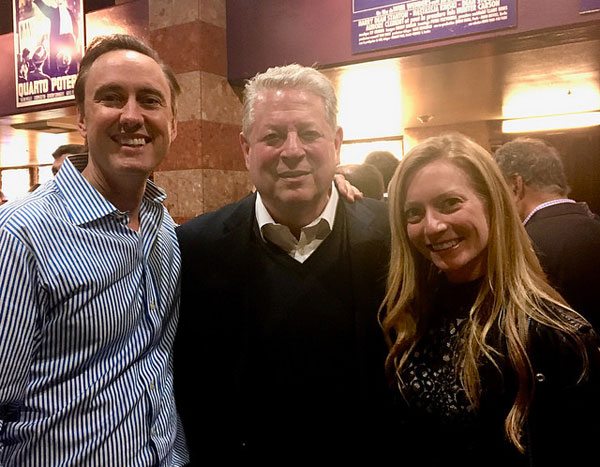
August 10, 2016; The Atlantic and the Boston Globe
In An Inconvenient Truth, Al Gore’s 2006 urgent call to save the planet from climate change, Gore predicted that one day we’d see ocean waters flooding into Ground Zero in Manhattan. In the opening scenes of his new film, An Inconvenient Sequel: Truth to Power, we hear the critics who found that prediction so extreme as to be downright ridiculous. Then, we watch the water flood through Lower Manhattan’s streets and subways right into the Twin Towers memorial, as predicted. Hurricane Sandy left $75 billion worth of damage in its wake.
Those heart-stopping images are among the many dramatic planetary crises that punctuate a narrative that tries to be uplifting despite the limited progress we have made toward solving the global climate crisis.
A travelogue of sorts, An Inconvenient Sequel follows Al Gore to Greenland, where the ice sheet is melting far more quickly than scientists anticipated. In the Philippines, we see the impact of Typhoon Haiyan, the most powerful storm to ever hit land. Images of parched earth in Syria are a reminder that the current civil war followed on years of drought, environmental devastation, and famine. Closer to home, Gore wades through the flooded streets of Miami, commenting that it is going to be hard—likely impossible—to keep pumping out the rising ocean. As Miami works to adapt its roadways to higher oceans, we are reminded that Governor Rick Scott is among those who refuses to recognize the crisis already severely impacting his state. In 2015, the Governor banned the term “climate change” from official Department of Environmental Protection communications.
As in An Inconvenient Truth, Al Gore’s slideshow and his effort to build a cadre of climate change educators is at the heart of An Inconvenient Sequel. We see Gore training new climate activists in Manila, Beijing, Miami, and Houston. Since 2006, Gore’s Climate Reality Project has trained more than 12,000 climate activists from 135 countries. This cadre of activists provides the real hope for our future, because in the corridors of power, even small steps forward take endless negotiations that may or may not result in real action.
Take Paris. The United Nations 2015 conference on climate change serves as the narrative climax of the film. We see Gore preparing to go to the Paris talks, and then serving as a key negotiator behind the scenes. India is not prepared to forgo the rapid development made possible by fossil fuels. Prime Minister Modi describes access to energy as a “human right” currently denied to 300 million Indians (almost the entire U.S. population). In today’s world, it would be hard to deny this truth.
But there is another truth as well: Our planet may be reaching a tipping point. Of the last 18 years, 10 have been the warmest on record, with 2016 surpassing all previous years. Storms, floods, droughts, heatwaves, wildfires are becoming increasingly common. An Inconvenient Sequel includes images from India, where in temperatures surpassing 120°F, people crossing the street literally become glued to the melting tar.
Sign up for our free newsletters
Subscribe to NPQ's newsletters to have our top stories delivered directly to your inbox.
By signing up, you agree to our privacy policy and terms of use, and to receive messages from NPQ and our partners.
Nonetheless, the split between industrialized Western nations who created the climate crisis and developing nations seeking to raise their standards of living has been difficult to bridge. Gore uses his “power” to broker a deal between India, its creditors, and Elon Musk, whom Gore urges to freely share intellectual property that would help speed up India’s transition to solar power.
Though the India deal may not have been the crucial turning point for the Paris agreement that it is in the film narrative, it shows the hard work necessary to broker a deal of this scale. The audience cannot help but feel cheered when world leaders gathered in Paris agree to set tangible goals to reduce fossil fuel emissions worldwide.
Paris would have provided a great ending for a film seeking to tell a can-do story about world leaders facing reality and taking on the greatest challenge of their time. But throughout the film, we get inklings of another setback to come. Donald Trump appears periodically as a climate denier, and one of his first acts after the election was to announce our nation’s withdrawal from the Paris climate accord. A non-binding agreement many considered inadequate from the get-go now faces an even bigger challenge.
Gore, appearing a little tired from the journey of the last decade, reminds us, “we’ve faced setbacks before.” He calls on us, the viewers, to take up the cause, using the hashtag #beinconvenient. To spur us on, he reminds us that there is good news. The cost of solar power has dropped dramatically in the past decade. Chile is well on its way to meeting its goal of producing 19 percent of the country’s electricity from solar energy by 2050. Towns and cities across America, including Republican-led Georgetown, Texas, are powered by 100 percent renewable sources.
Though not mentioned in the film, the reaction to the president’s decision to pull out of the Paris agreement has been heartening as well. Other countries, including India and China, have reconfirmed their commitments, and in the U.S., a group of 13 states, led by California, New York, and Washington, have joined together to create the U.S. Climate Alliance to keep the U.S. on track to meet its Paris commitments.
With Arctic ice melting, seas rising, and forests burning, we all have to ramp up our commitments. We may have a climate-denying president, but according to a recent Gallup poll, nearly 70 percent of Americans agree that humans are causing global warming.
Go check out Al Gore’s 10-minute slideshow and show it at your next meeting or Sunday service or neighborhood get-together. Then, decide what you can do to make a difference. There isn’t a lot of time left.— Karen Kahn













